Note: this one has a lot of photos. If you’re getting it by email, you might have to click on "view entire message” to see the whole thing.
The next day, after a light breakfast made by Teona, her husband Giorgi takes me to a monastery.
Giorgi doesn’t speak much English, and as soon as we arrive he leads me into the church, hands me 3 candles, and vanishes. I light them and say some prayers, then turn to find him in a room off to the side of the church. I join him, and he points silently to the tomb.
“St. Nino,” he whispers, before getting down on his knees and kissing it three times.
My eyes widen. Who is this St. Nino?
We wander the grounds, making our way down to the holy spring that’s said to bestow miracles. A nun appears and asks if I want to take a dip, even though we’re in winter jackets. Two Brazilian women did it just last week, she says, when she sees the look on my face. I decline, but drink some of the water and run over my hands.
I know better than to turn down a miracle.
When we get back to the car, I pull out google, and learn that St. Nino died in this very monastery, after having achieved the insignificant task of bringing Christianity to Georgia, 1600 years ago.
Also: St. Nino was a woman.
Next, we head to Sighnaghi. By the way, in keeping with the theme of this trip, I have a private driver for all my Kakheti touring needs. Giorgi and I might not be able to speak much, but that suits me fine. On journeys like this, I just want to stare in silence at the passing scenery, be lost in my imagination without interruption, and try to find the profound.
Giorgi drops me in Sighnaghi and leaves me to my own devices. As I walk along the cobblestone streets, thinking about St. Nino and what she must have gone through in her life, two woman appear next to me.
“Where are you from?” one asks.
I tell her.
“What’s it like, Canada? Do you like it there? What religion do you practice?”
I’m starting to feel uneasy. This doesn’t seem like a casual line of questioning, but I’ve been trying to practice being extra open-hearted these days.
“All religions,” I say.
“I think there’s only one god,” she says.
I nod, deciding to go with the most positive option of all the potential meanings of this sentence.
“And we will all go to paradise after our time on earth,” she adds.
I nod some more. She looks at me expectantly.
“I hope so,” is all I can say.
Both women look annoyed at my answer. The younger one thrusts a business card into my hand, and they walk off. I won’t say what’s on it, but I hang back. I’m all for as many gods as anyone wants, but am not a huge fan of proselytizing.
As I stand there awkwardly, a street dog appears, wagging his tail with such force his whole body sways from side to side. He leans his head into my thigh, as if to remind me that there is only one god, and you humans just spell it backwards.
Sighnaghi is tiny and magical, and mostly shut down for the winter. After some more walking and staring, I pop into a cosy winery restaurant, order a tasting menu and some cheese, and sit in an armchair by the fire.
The wine, if I may, (a friend of mine once said, “I’m far too interesting to know anything about wine”) is excellent.
Then I make my way back to Giorgi, and we head home.
But that night, I learn that this was just average wine for Kakheti. At Teona’s family’s home, where I’m lucky enough to be invited for dinner, I try Teona’s father’s wine. It’s even better than what I had at the fancy restaurant, and I should know. Giorgi continuously fills my glass with it, for the many toasts his father-in-law gives throughout the meal. (Freshly baked bread, more local cheese, and a chicken soup you would call home about if people still did that.) We raise our glasses to parents (his have passed on, Teona translates), to family, to children (and grandchildren), to me, to Canada.
And my favourite: to peace.
I go back the following night.
This time, I’m invited to help make churchkela, a Georgian speciality of dried grape “leather” coating a string of nuts.
There are four generations present—Teona’s grandparents join us, and her toddler nephew runs around, helpfully throwing fruit. Which is good, because making churchkela takes a whole family. You need a dipper, a stringer, and a rod-that-the-churchkhela-hangs-on-holder. Someone has to scrape the globs of melted fruit goo off the floor. Two people need to carry the churchkelas rod outside so they can dry.
It’s the most fun I’ve had in longer than I can remember.
There is more wine, and more toasting, and hands down the best barbecue I have ever eaten in my life.
Apparently you don’t have to wait until after your time on earth to find paradise.
You just have to come to Melaani.
My last full day in Georgia is a big one. In Telavi, Giorgi takes me to visit a 900-year old tree, two museums, and two churches. And en route there and back: more holy sites.
As a woman, I have to cover my head and sometimes wear a tie-on skirt in every church, which makes walking difficult. Everything is magical in the fog, but by the time we get to the Gremi Archangel Complex (which is a place, not a psychological condition), it’s late afternoon, and I’m ready to head home. According to my googling there’s nothing mysterious or exciting about it, but it’s on our way, and Teona insisted I visit.
Plus, when we pull into the parking lot at the foot of the hill, I see this:
Damn right it’s possible. But who is this lady?
As I walk uphill to the church, and feel something wet against my hand: another street dog, huge and white dog. He accompanies me to the church doorway and waits as I go inside.
No skirt is required.
I buy some candles from the friendly lady at the door, and as I start walking around, she starts muttering something. At first I think she’s speaking to me, but I look over to see she’s holding up a tiny book and flicking through prayer beads.
She’s praying.
Then, she’s chanting. For me? I don’t know, but I’m choking back tears yet again. I slip into a smaller room off to the side try to compose myself, and look up and see an image of the same woman as the one in the parking lot. This, I will learn later, is St. Nino.
I light candles here for all women. For the trauma we’ve carried, that gets been passed down from mother to daughter. For liberation for us all.
I step back outside, the lady at the door still singing.
There’s an even taller hill next to the church, on top of which appears to be some kind of tower. I go to take a photo, and am seized by the urge to climb up to it. I’ve made another new dog friend, and both of them join me for the climb.
I’m breathing hard by the time we arrive to see that the tower is actually another little chapel. Its steel door is firmly shut, so I’m shocked when I push it and it opens.
And here, I find what I’ve been looking for.
It’s everywhere: in the stillness, in the light, in the wind swishing through the trees, and in the other female presence here.
The numinous.
Is it St. Nino again? I wonder. I take that photo so I can ask Teona later, then remember Google translate. It is, in fact, King Tamar: the female king of Georgia.
(Her reign, coincidentally, marked a period of political and military successes and cultural achievements.)
“Why was she a king and not a queen?” I wonder automatically, then shake my head at the thought.
Why should she not be a king?
Here, I bumble through as many prayers as I can—for women, for family, for men, for all beings, for children, for parents, for dogs, for peace. I wish I could stay for hours. Reluctantly, I head back down the hill. The white dog stays by my side, all the way to the car.
I scratch his ears, wet from the rain, and he closes his eyes. My heart aches.
Stay safe, I tell him. Be kind.
Wiping away still more tears I climb back into the car.
Our final stop is a famous winery, known for its beautiful cave. Of course there’s a huge tour group here, and as I wait behind them to do the tasting, I notice myself doing my go-to tendency of mentally making myself small.
“Don’t mind me, I’m just a middle-aged lady, traveling alone.”
But I catch myself.
I could be a celebrity, for all they know. (I do have a private driver.)
I could be a famous travel writer who does know something about wine.
I could be… a king.
The wine is good, but of course not as good as Teona’s (which I will later be gifted a litre of and smuggle back in my backpack). But I smile politely, especially as there is bread, and cheese. The tour group lurches past, and a man who may have had one too many leans in and asks if he can have some of the cheese off my plate.
“It will cost you your head,” I say, silently.
Out loud, with all the graciousness I can muster, I say, “Please do.”
I catch the glance of the woman behind the counter.
And we smile.




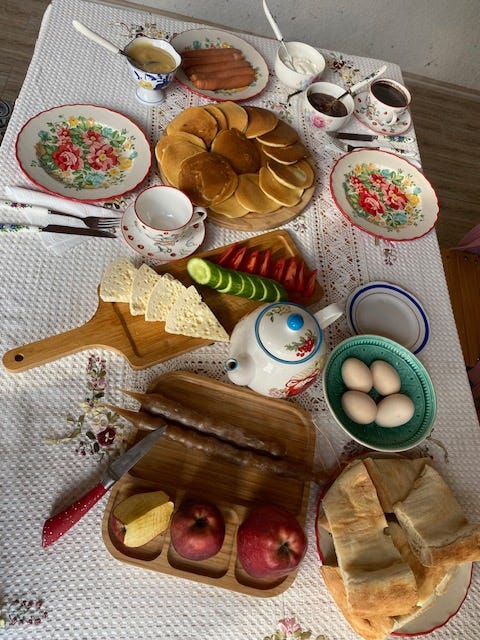
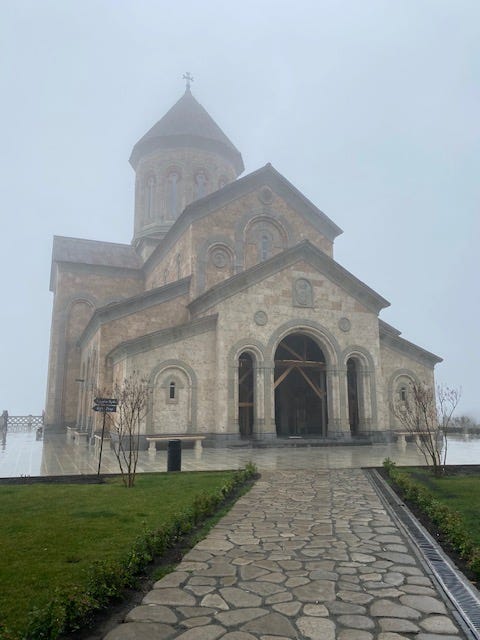

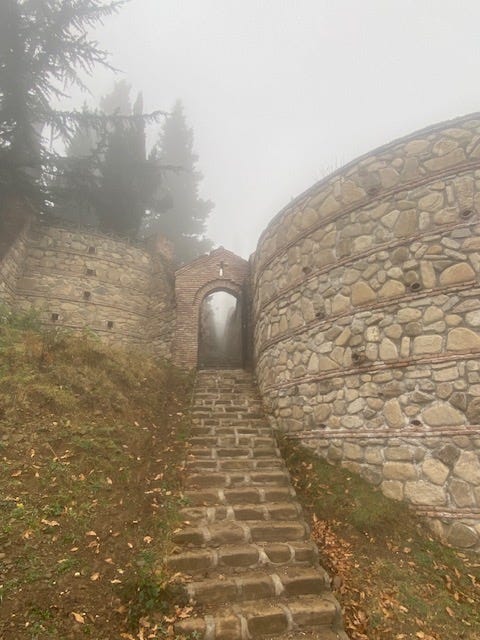
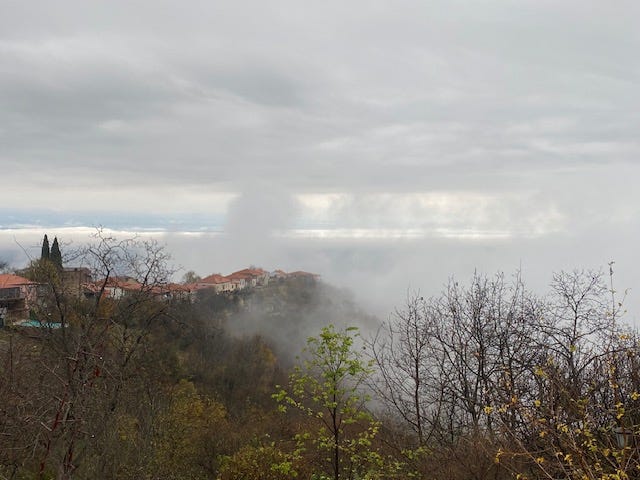

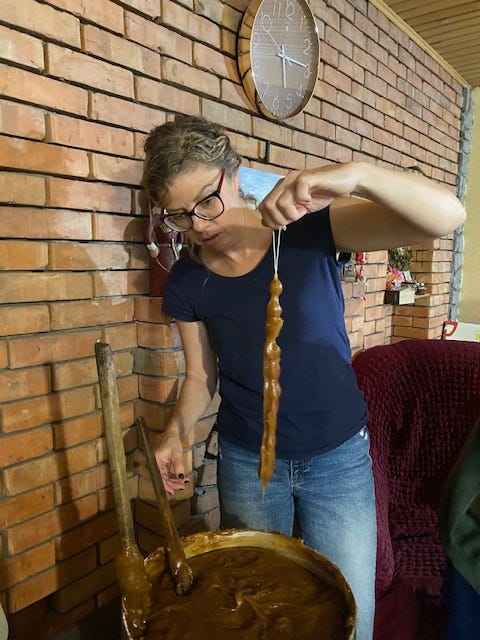
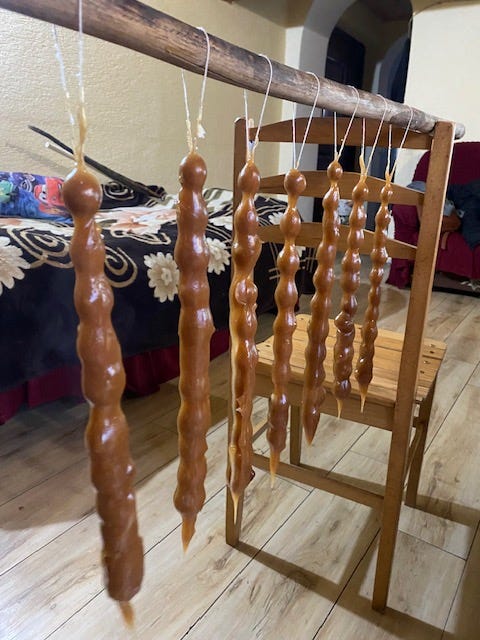




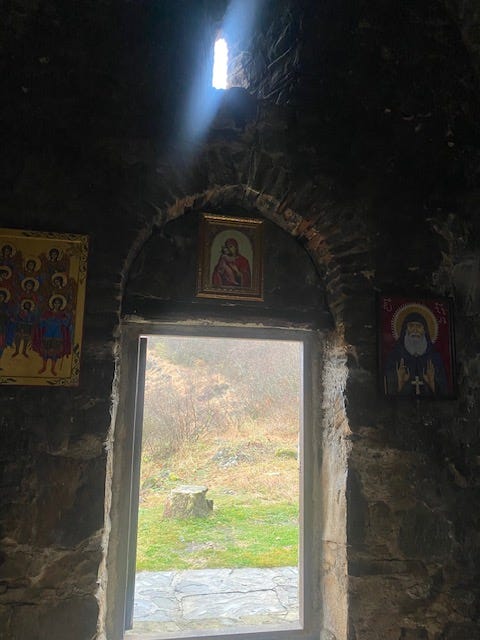
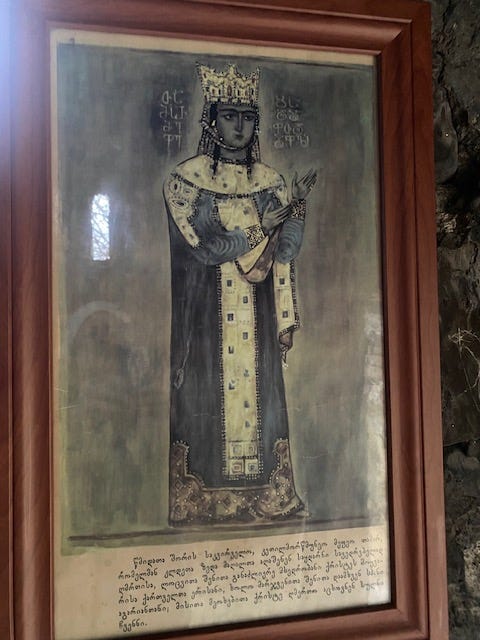
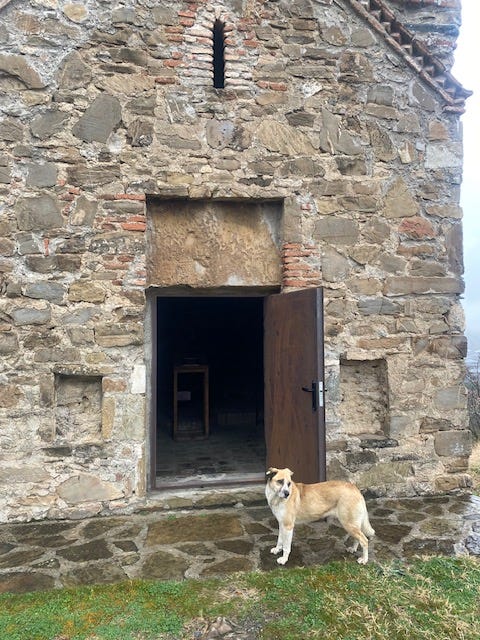
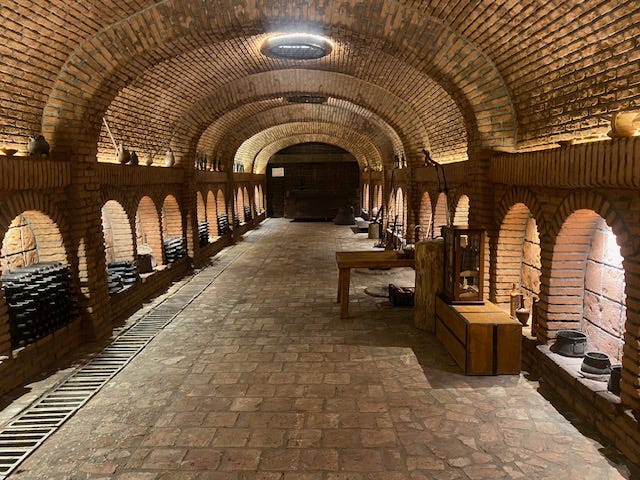
What a gift this is to me, the reader. Thanks for letting me see Georgia through your eyes, king Nathalie
Thanks Natalie, I love the glimpses into other worlds that you provide.